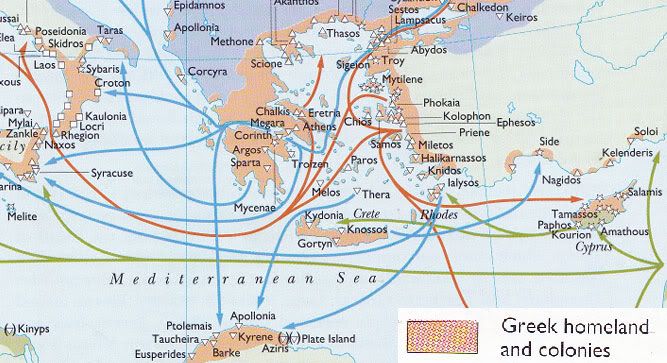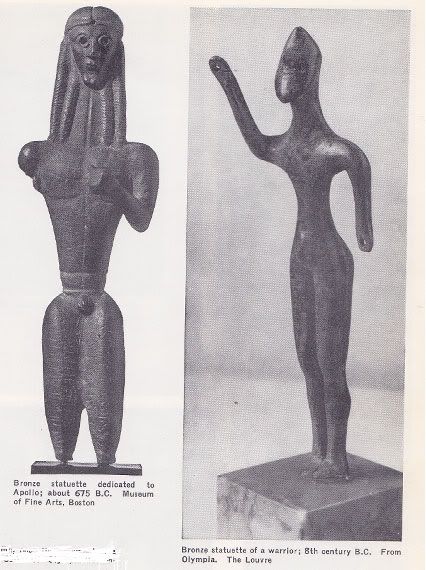Oracle wrote:Get Real! wrote:Oracle wrote:Get Real! wrote:Oracle wrote:Get Real! wrote:CONCLUSIONS-EPILOGUE“this analysis has shown that political considerations and academic trends have played a major role. Furthermore the archaeological evidence, usually squeezed into preexisting historical constructions, often illuminated from very specific angles, and sometimes even completely ignored, has not always been the prime source of inspiration. That is why the colonization narrative is lately regarded by more and more researchers as an unstable house of cards.”(Page 18 )
http://www.stanford.edu/dept/archaeolog ... /paper.pdf 
And
because she
failed to come up with
any evidence that indeed the colonisation narrative/theory is flawed, she had to include a proviso for undertaking such a thesis. After seeing the
overwhelming lack of evidence to support what she set out to show, she needs to
defend why she 'wasted' the time. So of course, she would say, 'it's topical' ... which is
all the bold statement says. And we
know it's topical because the Turks (and a few xerokefalli), use the academic 'need to question' merely to destabilise our alliances with Greece ....
I agree with the 'need to question', and research. But then at some point, you have to weigh up the evidence and draw a conclusion. Like it or not GR!, the overwhelming support for the Hellenisation of Cyprus (of which I am but one piece of living proof

), would make some more universally accepted theories in other areas, seem flimsy by comparison!
(Still trying to find a way to impress her for a date?

)
Oracle, you’re too sick in the head with Hellenism itself to be able to participate in any discussion/investigation surrounding this myth, so don’t worry about it.
You are allowed this face-saving withdrawal from your indefensible position.
You have a lot to learn from people like Natasa, who despite being Greek has not surrendered to Hellenic-hogwash brainwashing like you, and utilizes her intellect independently to investigate and question that which does not add up.
She is an archaeologist, so cultures are her specialty and I have praised her attempt to evaluate this "topical" theme by weighing up both schools of thought ... as I have done countless of times with my own specialties ... so you have nothing to teach me about independent investigation.
The fact she failed to prove what you erroneously assumed/hoped she would, shows how much
you have to learn about jumping to conclusions...
It seems to me that the basic difference between Get Real and Oracle is that Get Real read the article and understood it. Oracle pretended she understood what Leriou wrote claiming that because she'd once done some academic work on genetics that she could judge Leriou on archaeology.
Leriou writes
"it was not so long ago that many archaeologists thought, as some still do, that their main task was to establish a series of historical events, a sequence of facts that occurred in a specific area during a specific time-period. The more detailed, precise and objective these narratives were, the better (Snodgrass 1983: 142-143, 145-146)."
She is critical of this view, and this criticism - which incidentally is a criticism of the kind of view taken by Oracle and Paphitis - forms the basis of the article. And she reinforces her criticism by noting that
"When repeated frequently, historical reconstructions based on mere speculation, guesses or misunderstandings are eventually taken for incontrovertible, historical facts. Maier calls them factoids1 (Maier 1985: 32; Goring 1995: 103) and states: “there is something unbiological about such factoids: the tendency to get stronger the longer they live is one of their most insidious qualities. Factoids occur in all branches of scholarship and many are of course still well disguised -their complete discovery would create havoc in the subjects concerned. Archaeology, converted from treasure hunting into a historical discipline, is for obvious reasons prone to create a number of factoids” (Maier 1985: 32)."
For some reason Oracle and Paphitis completely ignore these comments and, worse, carry on doing what Leriou has explicitly criticised. So badly have they read Leriou that they try to claim Leriou as one of their own !!!
Pages 6 & 7 are exactly an outline of the kinds of problems produced by the kind of ideological thinking which characterizes nationalist archaeology, the like sof which Oracle and Paphitis approve. Page 9 sets out Leriou's explanation of why philhelenism arose and had its effect on archaeology and the formation of the dominant narrative.
That dominant narrative, Leriou explains, was fostered by the British colonial authorities, thus :
"The British attitude towards the past as well as the antiquities of Cyprus may be viewed as one aspect of a more general scheme to establish a good rapport with the colonized population, which was officially still under the sovereignty of the Turks.
Unlike the latter, the British were (= thought and/ or presented themselves as) liberal philhellenists, bearers of justice and equality (Given 1997: 11-12). This policy was mainly reflected in the remarkable autonomy that the Cypriots, both Greek and Turkish, were enjoying in the field of education9. They were entitled to manage their schools, appoint teachers of their choice, compile the curricula and choose or even produce schoolbooks (Hunt 1990a: 266-67; Pavlides 1993: 244-248; Merrillees 1993:
4-5; Given 1997: 64-65).
The Greek Cypriots used these liberties wisely to reinforce their Hellenic
identity thus supporting the ever-growing nationalistic movement demanding enosis with Greece: they followed the curricula and used the books of the Greek schools and very frequently appointed Greek teachers. Consequently Greek Cypriot students were being taught classical Greek language and literature, Greek history and geography (Hill 1952: 492-493). This hellenocentrism in Cypriot education was particularly evident in the architecture of school buildings, which acquired neo-classical characteristics like columnar facades, pediments, sculptured decoration etc. (Given 1997: 66-69). The Pancyprian Gymnasium in Nicosia, constructed in 1893, was the best example of this architecture and was thus considered the flagship of Greek education in Cyprus (Given 1997: 67 fig. 1)."
So again we see Leriou trying to explain why and how a narrative develops and is shaped.
Oracle says that "narrative" is equivalent to "theory" : no it is not. There are numerous theoretical approached to narrative. Narrative as Get Real said, is basically, a story. What Leriou is doing here - she says so explicitly - is to trace examine the formation of a narrative, in this case a dominant narrative. She is not concerned here with 'proving' this narrative right or wrong. To that extent there's no surprise, Paphitis, that she doesn't prove a non-Hellenic myth : it wasn't her objective or purpose. (It's like decrying Liverpool for not beating Chelsea when they're in fact playing Newcastle). And no Oracle, Leriou is not involved in a deconstruction: you'd have thought that if she was she might have mentioned at least once the word deconstruction or make some reference to Derrida. She does neither.












